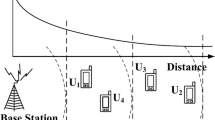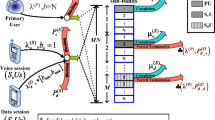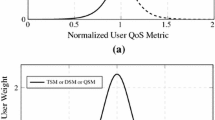Abstract
This paper explores analytical Radio Resource Management models where the relationship between users and services is mapped through utility functions. Compared to other applications of these models to networking, we focus in particular on specific aspects of multimedia systems with adaptive traffic, and propose a novel framework for describing and investigating dynamic allocation of resources in wireless networks. In doing so, we also consider economic aspects, such as the financial needs of the provider and the users’ reaction to prices. As an example of how our analytical tool can be used, in this paper we compare different classes of RRM strategies, e.g., Best Effort vs. Guaranteed Performance, for which we explore the relationships between Radio Resource Allocation, pricing, provider’s revenue, network capacity and users’ satisfaction. Finally, we present a discussion about Economic Admission Control, which can be applied in Best Effort scenarios to further improve the performance.
Similar content being viewed by others
References
E. Altman, A. Orda, and N. Shimkin, Bandwidth allocation for guaranteed versus best effort service categories, in: Proceedings INFOCOM, (1998) vol. 2 pp. 617–624.
L. Badia, M. Lindström, J. Zander, and M. Zorzi, Demand and pricing effects on the radio resource allocation of multimedia communication systems, in: Proceedings IEEE Globecom, (2003) vol. 7 pp. 4116–4121.
L. Badia and M. Zorzi, Radio resource management with utility and pricing for wireless LAN hot-spots, Kluwer Wireless Personal Communication Journal 34(1–2) (July 2005) 127–142.
L. Badia, M. Zorzi, and A. Gazzini, A model for threshold comparison call admission control in third generation cellular systems, in: Proceedings ICC, (2003) vol. 3 pp. 1664–1668.
C. Comaniciu, N. Mandayam, D. Famolari, and P. Agrawal, Admission and flow control for multimedia CDMA, in: Proceedings IEEE Conference on Multimedia and Expo (ICME), (2000) vol. 3 pp. 1265–1268.
D. Famolari, N. Mandayam, D. Goodman, and V. Shah, A New Framework for Power Control in Wireless Data Networks: Games, Utility and Pricing, (Kluwer Academic Publishers, 1999) chapter 1 pp. 289–310.
R.J. Gibbens and F.P. Kelly, Resource pricing and the evolution of congestion control, Automatica 35 (1999) 1969–1985.
J. Hou, J. Yang, and S. Papavassiliou, Integration of pricing with call admission control to meet QoS requirements in cellular networks, IEEE Transactions on Parallel and Distributed Systems 13(9) (Sept 2002) 898–910.
H. Jiang and S. Jordan, A pricing model for high speed networks with guaranteed quality of service, in: Proceedings INFOCOM, (1996) vol. 2 pp. 888–895.
F. Kelly, A. Maulloo, and D. Tan, Rate control in communication networks: shadow prices, proportional fairness and stability, Journal of the Operational Research Society 49 (1998) 237–252.
H. Lin, M. Chatterjee, S.K. Das, and K. Basu, ARC: An integrated admission and rate control framework for competitive wireless CDMA data networks using non-cooperative games, IEEE Transactions on Mobile Computing 4(3) (2005) 243–258.
C. Saraydar, N. Mandayam, and D.J. Goodman, Efficient power control via pricing in wireless data networks, IEEE Transactions on Communications 50(2) (2002) 291–303.
S. Shenker, D.D. Clark, D. Estrin, and S. Herzog, Pricing in computer networks: Reshaping the research agenda, ACM Computer Communication Review 26 (1996) 19–43.
V. Siris, Resource control for elastic traffic in CDMA networks, in: Proceedings ACM MobiCom (2002) pp. 193–204.
R.M. Spiegel, Theory and Problems of Statistics (McGraw-Hill, New York, 1996).
A.M. Viterbi and A.J. Viterbi, Erlang capacity of a power controlled CDMA system, IEEE Journal on Selected Areas in Communications 11(6) (1993) 892–900.
M. Xiao, N.B. Shroff, and E.K.-P. Chong, Utility-based power control in cellular wireless systems, in: Proceedings INFOCOM (2001) pp. 412–421.
J. Zander and S.-L. Kim, Radio Resource Management for Wireless Networks (Artech House, Norwood MA, 2001).
C. Zhou, M.L. Honig, S. Jordan, and R. Berry, Utility-based resource allocation for wireless networks with mixed voice and data services, in: Proceedings of the International Conference on Computer Communications and Networks (2002) pp. 485–488.
Author information
Authors and Affiliations
Corresponding author
Additional information
Part of this work has been presented at the conference ACM/IEEE MSWiM 2004, Venice (Italy).
Leonardo Badia received a Laurea degree (with honors) in electrical engineering and a Ph.D. in information engineering from the University of Ferrara, Italy, in 2000 and 2004, respectively. He was a Research Fellow at the University of Ferrara from 2001 to 2006. During these years, he also had collaborations with the University of Padova, Italy, and Wireless@KTH, Royal Institute of Technology, Stockholm, Sweden. In 2006, he joined the “Institutions Markets Technologies” (IMT) Institute for Advanced Studies, Lucca, Italy, where he is currently a Research Fellow. His research interests include wireless ad hoc and mesh networks, analysis of transmission protocols, optimization tools and economic models applied to radio resource management.
Michele Zorzi received a Laurea degree and a Ph.D. in electrical engineering from the University of Padova in 1990 and 1994, respectively. During academic year 1992–1993, he was on leave at UCSD, attending graduate courses and doing research on multiple access in mobile radio networks. In 1993 he joined the faculty of the Dipartimento di Elettronica e Informazione, Politecnico di Milano, Italy. After spending three years with the Center for Wireless Communications at UCSD, in 1998 he joined the School of Engineering of the University of Ferrara, Italy, where he became a professor in 2000. Since November 2003 he has been on the faculty at the Information Engineering Department of the University of Padova. His present research interests include performance evaluation in mobile communications systems, random access in mobile radio networks, ad hoc and sensor networks, energy constrained communications protocols, and broadband wireless access. He was Editor-In-Chief of IEEE Wireless Communications, 2003–2005, and currently serves on the Editorial Boards of IEEE Transactions on Communications, IEEE Transactions on Wireless Communications, Wiley’s Journal of Wireless Communications and Mobile Computing, and ACM/URSI/Kluwer Journal of Wireless Networks, and on the Steering Committee of the IEEE Transactions on Mobile Computing. He has also been a Guest Editor of special issues in IEEE Personal Communications (Energy Management in Personal Communications Systems) and IEEE Journal on Selected Areas in Communications (Multimedia Network Radios).
Rights and permissions
About this article
Cite this article
Badia, L., Zorzi, M. Dynamic utility and price based radio resource management for rate adaptive traffic. Wireless Netw 14, 803–814 (2008). https://doi.org/10.1007/s11276-007-0015-z
Published:
Issue Date:
DOI: https://doi.org/10.1007/s11276-007-0015-z




